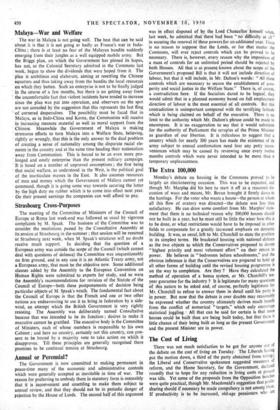Annual or Perennial?
The Government is now committed to making permanent in peace-time many of the economic and administrative controls which were generally accepted as inevitable in time of war. The reason for preferring to embody them in statutory form is ostensibly that it is inconvenient and unsettling to make them subject to annual review, and that they should not be in periodic danger of rejection by the House of Lords. The second half of this argument was in effect disposed of by the Lord Chancellor himself uhen, last week, he admitted that there had been "no' difficulty at all" in securing the renewal Of these powers for an additional year. There is no reason to suppose that the Lords, or for that matter the Commons, will ever reject controls which can be proved to be necessary. There is, however, every reason why the imposition of a mass of controls for an unlimited period should be rejected by both Houses. All that is at present, known about the scope of the Government's proposed Bill is that it will not include direction of labour, but that it will include, in Mr. Dalton's words: "All those controls which are necessary to secure the establishment of pros- perity and social justice in the Welfare State." There is, of course, a contradiction here. If the Socialists dared to be logical, they would admit that in a planned economy based on full employment direction of labour is the most essential of all controls. But this contradiction is unimportant compared with the terrifying latitude which is being claimed on behalf of the executive. There is no limit to the authority Which Mr. Dalton's phrase could be made to encompass. It is -no exaggeration to say that it would substitute for the authority of Parliament the scruples of the Prime Minister as guardian of our liberties. It is ridiculous to suggest that a country which for nearly 300 years has made the existence of its army subject to annual confirmation need fear any petty incon- veniences which may be caused by reviewing once every twelve months controls which were never intended to be more than a temporary unpleasantness.


















































 Previous page
Previous page